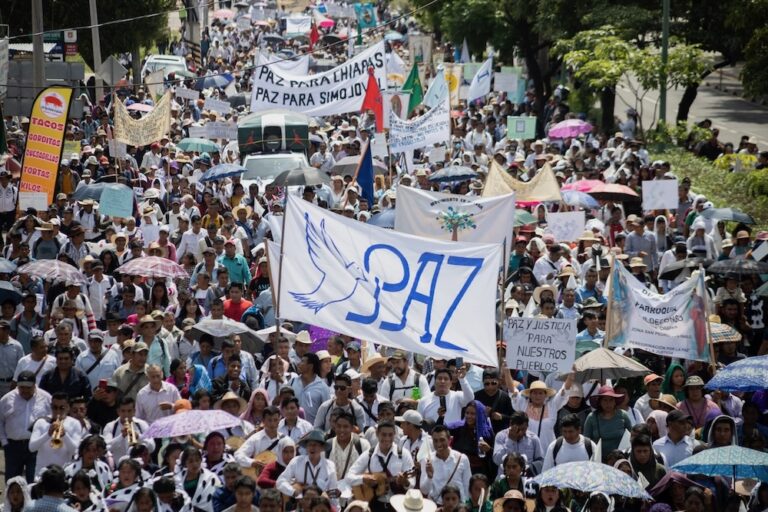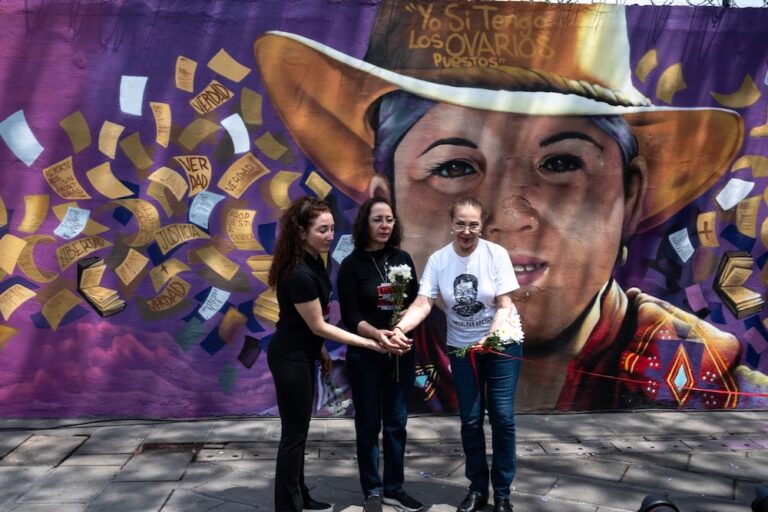(WiPC/IFEX) – The following is WiPC’s International Women’s Day statement: INTERNATIONAL WOMEN’S DAY 8 MARCH 2006 MEXICO: Lydia Cacho “Writing or reading a book on the abuse and trade of children is neither easy nor enjoyable. Nevertheless, it is more dangerous for society to remain silent about this phenomenon. Whilst society and the State looks […]
(WiPC/IFEX) – The following is WiPC’s International Women’s Day statement:
INTERNATIONAL WOMEN’S DAY
8 MARCH 2006
MEXICO: Lydia Cacho
“Writing or reading a book on the abuse and trade of children is neither easy nor enjoyable. Nevertheless, it is more dangerous for society to remain silent about this phenomenon. Whilst society and the State looks on, thousands of children are victims of dealers who turn them into sexual objects to be traded and enjoyed by millions of men who find in child pornography and the sexual abuse of children a thing of delight which has no ethical repercussions.” Lydia Cacho, excerpt from: Los demonios del edén: El poder que protege a la pornografía infantile (The Demons of Eden: The power that protects the child pornography [industry]), published by Grijalbo in 2005.
To mark International Women’s Day on 8 March, International PEN Writers in Prison Committee is focusing on the case of the Mexican writer and journalist Lydia Cacho. Cacho currently faces trial under charges of criminal defamation related to her exposure of the connection between businessman José Camel Nacif Borge and alleged child pornographer Jean Succar Kari, in the book Los demonios del edén: El poder que protege a la pornografía infantile (The Demons of Eden: The power that protects the child pornography [industry]). If convicted of criminal defamation she could be subject to a sentence of up to four years in prison. Lydia Cacho also runs a centre for women who have been the victims of violence; writes a political column for the newspaper La Voz del Caribe; contributes to the Mexico City-based magazines Día Siete and Tentaciones; is the editorial director of the magazine Esta boca es mía (This mouth is mine); and is a presenter of a television programme of the same name. She has endured a number of death threats related to her work.
International PEN Writers in Prison Committee condemns the criminal defamation case against Mexican writer and journalist Lydia Cacho and calls for an end to the judicial harassment and the continuing threats to her personal safety that she has endured. PEN also calls for all charges against Cacho and other Mexican writers and journalists affected by similar legislation to be immediately dropped, and that they be allowed to exercise the right to practice their professions in accordance with Article 19 of the United Nations Declaration of Human Rights that guarantees the right to freedom of expression.
Legal Action
Criminal charges of “defamation” and “calumny” were brought against Cacho in October 2005 by textile businessman José Camel Nacif Borge, who is cited in Cacho’s book Los demonios del edén: El poder que protege a la pornografía infantile (The Demons of Eden: The power that protects the child pornography [industry]), as having connections with Jean Succar Kuri, currently detained in the United States and accused of heading up a child pornography and prostitution network. The legal action against Cacho was taken in the state of Puebla. Notice of the charges and a demand for her to appear in court were apparently sent to the author but she claims that no such letter arrived at any of her registered addresses. Camel Nacif does not deny knowing Succar Kuri but claims that his reputation has suffered as a result of Cacho’s book making his relationship with him common knowledge.
Detention and trial
On 16 December 2005, Cacho (42) was detained by Puebla state judicial officers in Cancún, Quintana Roo. The officers apparently arrested her in her office, bundled her into a vehicle and drove her to Puebla, a journey of approximately twenty hours. Cacho has questioned the legality of officials from Puebla making an arrest in Quintana Roo before steps had been taken to ensure that she was aware of the charges brought against her. She also reported that she was not allowed to contact her lawyer or take with her the medicines she needs to control her bronchitis.
Judge Rosa Celia Pérez González, of Puebla’s Fifth Penal Court (Juzgado Quinto en lo Penal de Puebla), released Cacho from San Miguel State Prison the following day on bail of 106,000 pesos (US$9,900) pending a further ruling on 23 December. On that date, Judge Pérez ordered that Cacho be detained awaiting trial. However, she will remain free since she lodged an appeal against the decision and had already posted bail.
The author has stated that she believes Camel Nacif has brought the charges at the bidding of Succar Kari in order to discredit her book and strengthen the latter’s defence case.
Over the few months since the publication of the book, Cacho has received the protection of bodyguards provided by the General Procurator’s Office on account of the repeated death threats she has received.
She faces between six months and four years in prison if convicted.
Sources of information:
Original International PEN case alert: http://www.internationalpen.org.uk/index.php?pid=33&aid=421
Photograph of Lydia Cacho being awarded the ‘Premio Francisco Ojeda al Valor Periodístico’ whilst detained: http:www.ocvive.com/noticias/newswires/2006/febrer
Reporters sans frontières English-language chronology of Cacho’s case: http://www.rsf.org/article.php3?id_article=16012
Amnesty International Urgent Action reporting death threats made against Cacho: http://web.amnesty.org/library/Index/ENGAMR410112006?open&of=ENG-315


